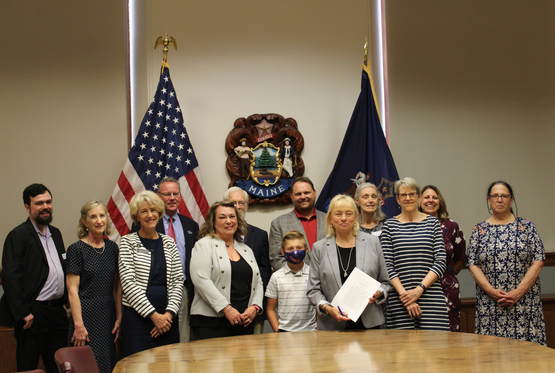The following bills, some of which MeBIC has worked on for five years, were enacted and appropriately funded this session:
– LD 1684, An Act To Strengthen Maine’s Workforce by Expanding English Language Acquisition and Workforce Training Programs.
English is critical to immigrant advancement, and LD 1684 will fund urgently needed expanded adult education English for Speakers of Other Languages (ESOL) class capacity, and create new combined adult ESOL/job skills classes in collaboration with employers. MeBIC business partners, including 26 signers of the Maine Compact on Immigration, testified in favor of this important workforce development investment, which passed with enthusiastic bipartisan support.
Back to top
– LD 1329, An Act To Establish the Career Advancement and Navigation Initiative in the Department of Education To Lower Barriers to Career Advancement.
This bill’s provisions were moved into and will be funded by LD 1733, which allocated use of federal COVID-19 recovery funds. It creates a pilot Career Advancement and Navigation Initiative in adult education programs serving eight Maine counties, to provide adult education students – immigrants and native-born Mainers alike – with expert career guidance and direction, in collaboration with employers in sectors experiencing workforce shortages. Strong business support, including MeBIC business partners and nearly a dozen signatories to the Maine Compact on Immigration, was instrumental to this bill’s bipartisan passage.
Back to top
– LD 149, An Act To Facilitate Licensure for Credentialed Individuals from Other Jurisdictions.
Maine’s immigrants on average arrive here with greater rates of higher education and advanced degrees than native-born Mainers, yet barriers to recognition of their foreign educations and credentials often sideline their careers in the U.S. LD 149 gives Maine’s Office of Professional and Occupational Regulation new flexibility to accept foreign credentials, as well as licenses of those moving to Maine from other states. Many MeBIC business partners and signatories to the Maine Compact on Immigration helped get this bill over the finish line with bipartisan support.
Back to top
– LD 1533, An Act To Amend the Foreign Credentialing and Skills Recognition Revolving Loan Program.
This bill amended a FAME interest-free loan program originally developed by MeBIC to help immigrants awaiting their initial work permits pay for work-readiness expenses, ranging from costs of translating and evaluating their foreign educational credentials, to driver’s education classes. The bill added the initial work permit application fee ($495 currently) as an allowed expense and made other technical amendments. Governor Mills signed the bill on June 8th.
Back to top
MeBIC also supported various bills successfully enacted to address systemic racism and advance racial and economic equity, including LD 2, LD 132, LD 1034, and LD 1167.
Carried over to 2022:
– LD 718, An Act To Improve the Health of Maine Residents by Closing Coverage Gaps in the MaineCare Program and the Children’s Health Insurance Program
Many low-income immigrants, including permanent residents here for fewer than five years, asylum seekers, those with DACA or TPS status, and others who work full time in jobs that don’t provide health insurance, are ineligible for MaineCare solely due to their immigration status. The pandemic has made clear – it’s critical that all Mainers can access the healthcare they need to stay healthy, which in turn helps keep their co-workers and families healthy. LD 718 would allow all income-eligible Mainers to access healthcare, regardless of immigration status, and is a smart investment in Maine’s people and economy
LD 149 and LD 1684 enacted! MeBIC’s Beth Stickney joins lead sponsor Rep. Kristen Cloutier and other co-sponsors and supporters as Governor Janet Mills signs these two bills into law.


